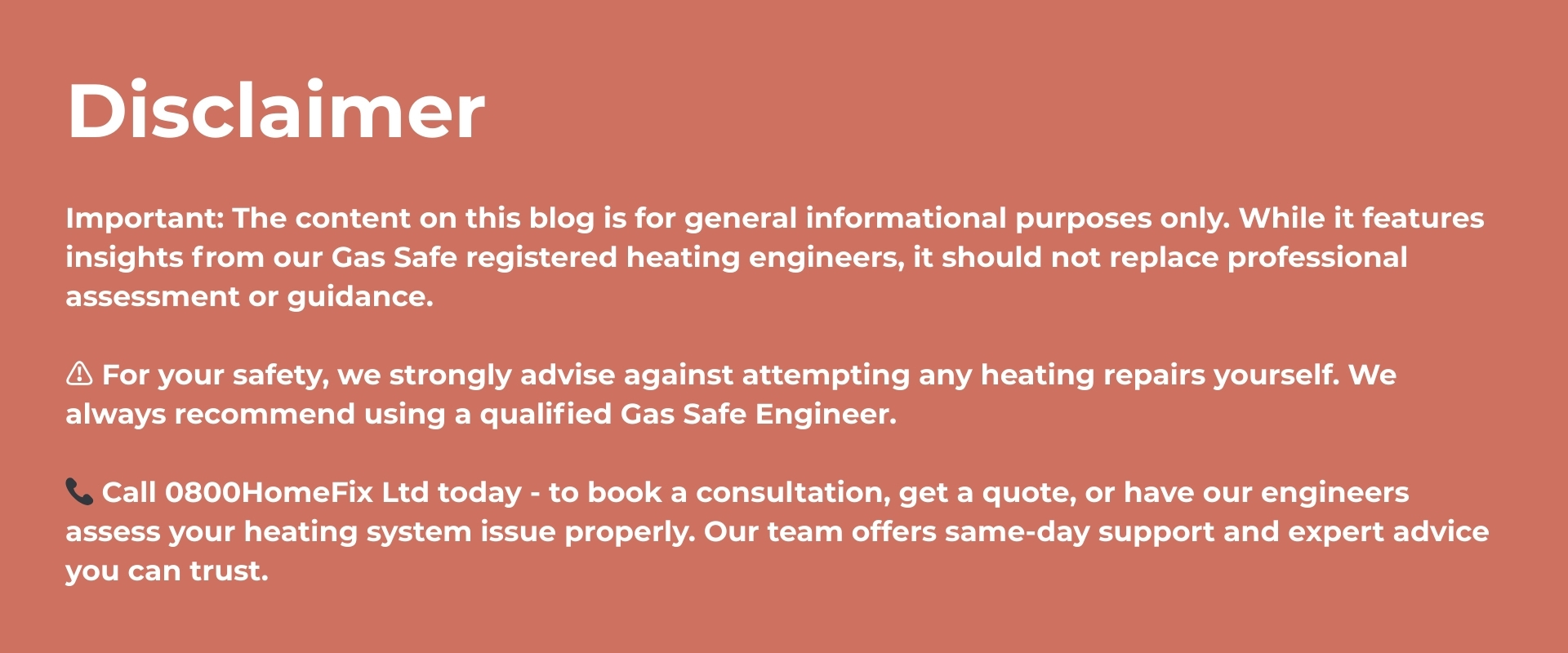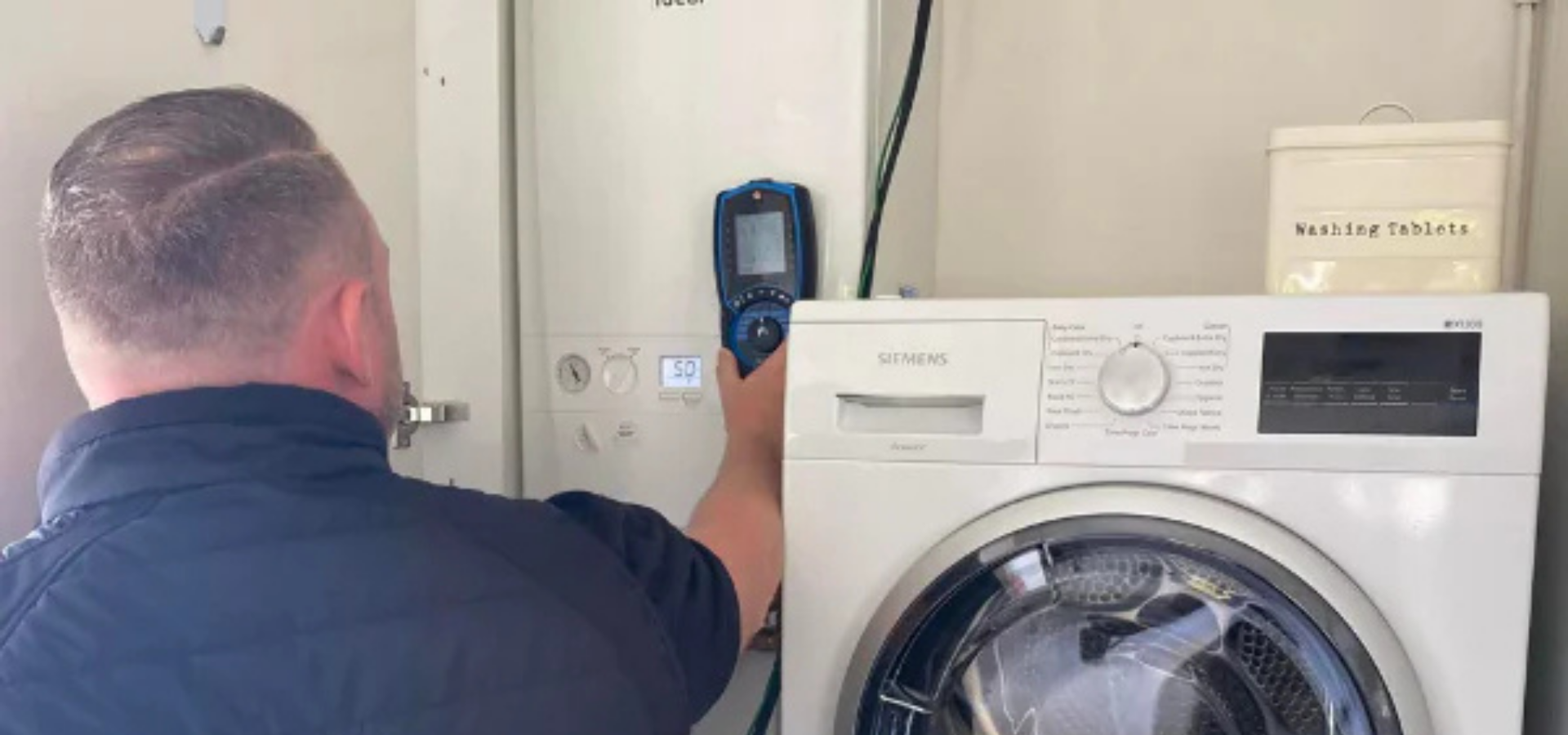

Few things are more frustrating than switching on your central heating, hearing the boiler fire up, but finding that your radiators stay cold. It is a surprisingly common problem, particularly with combi boilers, and can be confusing when the boiler itself seems to be running without any obvious errors. This issue can be especially confusing in an older boiler, which may not display clear fault codes.
This situation often points to issues elsewhere in the system – from thermostats and timers to diverter valves, pumps, or radiators. While some checks are simple for homeowners to carry out, others require the expertise of gas safe engineers. If you suspect your boiler or any gas appliance is unsafe, it is important to stop using it and contact a qualified professional immediately. Knowing what to look for, and when to call in the professionals at 0800 Homefix, can save time, money, and unnecessary stress.
Checking the Basics
Before assuming the worst, it is always worth checking the simple things first. Many heating failures are caused by minor settings or electrical issues that can be resolved quickly.
Ensure that the boiler has a reliable power supply. Check the electricity supply by inspecting the isolator and trip switches, as an interruption here can stop the heating system from working. A tripped fuse or power cut may cause the control panel to light up but fail to run heating programmes correctly. Inspect your fuse box, confirm switches are on, and reset if necessary.
Next, consult the boiler control panel. Most modern Worcester, Vaillant, Ideal, Baxi, and Potterton models display error codes or warning messages when something is wrong. These can provide valuable clues. If you encounter a fault, locate the reset button on the boiler control panel and try resetting the boiler as a troubleshooting step, following the manual if needed. Always refer to the boiler manual for guidance on what the code means and whether it relates to heating.
Check the room thermostat. If the thermostat is set too low, the boiler may prioritise hot water without engaging the central heating. For wireless thermostats or timers, check and replace the batteries if necessary, as low or dead batteries can cause malfunctions. Likewise, timers can sometimes be accidentally reset after a power cut. Verify the heating programme is set correctly for the times you expect the radiators to come on. Ensure the timer set is correct and that settings have not been set incorrectly after a power cut or manual adjustment.
If these basic checks don’t resolve the issue, the problem may lie deeper in the heating system.
Boiler Pressure and Settings
Boiler pressure is vital for circulating water around radiators. If the pressure drops below around 1 bar, your heating may fail even though the boiler itself continues to run. Low boiler pressure is a common cause of heating and hot water problems, and you may need to add more water to the system to restore proper operation. Conversely, excessively high pressure may cause the system to lock out or vent water through the relief pipe, preventing effective heating.
Check the boiler pressure gauge. Most systems should be between 1 and 2 bar when cold, rising slightly when hot. Always check the water pressure and consult the user manual for step-by-step instructions on how to repressurize the system if needed. If the gauge shows low pressure, repressurising via the filling loop may restore heating. Always follow the manufacturer’s instructions carefully, or contact 0800 Homefix for safe guidance.
Boiler settings also matter. Incorrect settings can lead to boiler issues, such as failing to generate hot water or the heating not working properly. Some models allow homeowners to select between hot water only, heating only, or combined modes. If heating has been disabled accidentally, radiators will remain cold despite the boiler appearing to run normally.
The pressure relief valve should also be functioning correctly. If stuck open or faulty, it can release water and prevent pressure from stabilising. This is not something to repair yourself, you should always seek professional heating system repairs to avoid safety risks.
Thermostat and Timer Settings
A faulty thermostat is one of the most common reasons heating won’t come on, even with a working boiler. If the thermostat fails to communicate with the boiler, the heating demand is never triggered.
Check the thermostat is set to a reasonable temperature. Adjusting the thermostat temperature can help ensure the heating system reaches the desired temperature for comfort. In colder weather, a setting of at least 18–21°C is recommended for comfort. Make sure the device is not affected by direct sunlight or draughts, which can distort its readings and prevent heating from activating. Room thermostats can vary depending on whether they are traditional or wireless models, so their placement and settings should be checked to ensure the heating is controlled effectively.
Timers and programmers are another frequent culprit. Double-check the time and schedule are correct. Sometimes clocks run slow or reset after a power outage, leading to heating coming on at unexpected times.
If you find your current thermostat unreliable, consider upgrading to a smart thermostat such as Hive, Nest, or Honeywell. These devices provide better control, can be adjusted remotely, and often integrate with mobile apps for convenience. For advice on compatibility and installation, contact 0800 Homefix.
Combi Boiler Considerations
Combi boilers supply both heating and hot water without the need for separate cylinders or tanks. While efficient, they rely on internal components like diverter valves to switch between heating and hot water. If the diverter valve sticks or fails, the boiler may continue producing hot water while neglecting the central heating. This is a common scenario where you have hot water working but water but no heating, often indicating a fault within the boiler system that requires attention.
Another issue specific to combi boilers is system configuration. If settings prioritise hot water, heating may be delayed or fail to engage. Always consult the manual for recommended configurations, or book an inspection with gas safe engineers.
Regular servicing is particularly important for combi boilers. During a service, engineers at 0800 Homefix check the diverter valve, pump, expansion vessel, and other components to ensure everything works efficiently. Preventive maintenance can stop these problems before they arise.
Radiator and Valve Issues
Sometimes the boiler is fine, but the problem lies with the radiators themselves. It’s also important to check the pipes connected to the radiators for leaks, blockages, or freezing, as issues with pipes can prevent proper heating. Cold spots, gurgling noises, or partially warm radiators suggest trapped air in the system. Bleeding the radiators with a radiator key can release air and restore heating.
Check radiator valves. If they are closed or seized, water cannot circulate. Thermostatic radiator valves (TRVs) are particularly prone to sticking when left unused, especially after summer. Gently adjusting them may restore flow.
Old or corroded valves can also restrict circulation. Replacing them can improve efficiency and ensure more consistent heating across your home.
If bleeding radiators doesn’t solve the issue, the system may require balancing – a process where water flow is adjusted so that each radiator receives an even share. This is best carried out by a professional heating engineer.
Diverter Valve and Pump Issues
The diverter valve is one of the most common causes of heating failures in combi boilers. If stuck, it may send hot water only to taps and showers, leaving radiators cold. Identifying and repairing a faulty diverter valve requires dismantling the boiler, which should only be attempted by a gas safe registered engineer.
Pumps are another key component. The pump circulates water through radiators. If the pump is not functioning, the system may not have enough hot water circulating to heat the radiators effectively. If it becomes blocked, worn, or electrically faulty, water will not move through the system effectively. Symptoms of a failing pump include noisy operation, radiators that only heat partially, or a system that works intermittently.
Upgrading to a modern, energy-efficient pump can reduce energy use and improve system performance. If you suspect pump or valve problems, contact 0800 Homefix for expert heating system repairs.
Annual Maintenance
Annual servicing is the most effective way to prevent heating issues. Booking an annual boiler service is essential to ensure the continued safe and efficient operation of your heating system. A routine boiler servicing includes checking the gauge, expansion vessel, diverter valve, pump, and radiator function. Engineers also test safety devices, flues, and gas pressures.
Regular maintenance identifies small issues before they escalate into costly breakdowns. Many homeowners choose to invest in boiler care plans, which spread the cost of servicing and cover repairs.
By booking a yearly service with 0800 Homefix, you ensure your boiler runs safely and efficiently, reducing the risk of heating failures when you need warmth most.
Heating System Checks
Beyond the boiler, the wider heating system needs attention too. Inspect the central heating system for issues such as blockages, leaks, or corrosion. Leaks, corrosion, or blockages in pipework can stop radiators heating properly. Perform visual checks for damp patches, water stains, or rust around joints and radiators.
System balancing is another often-overlooked step. If some radiators are much hotter than others, the flow may need adjustment. Professionals can measure output and rebalance the system for even heat distribution.
If you live in an older property, sludge and debris may have built up in pipework. In such cases, a system flush may be recommended to restore full efficiency. A power flush is an effective way to clean out debris and improve the performance of the central heating system. 0800 Homefix offers flushing services as part of their heating maintenance solutions.
Troubleshooting Steps
For homeowners, a few troubleshooting steps can be safely attempted:
- Check the manual for error codes.
- Repressurise the boiler if pressure is low.
- Bleed radiators to release trapped air.
- Confirm thermostat and timer settings are correct.
If the above steps do not resolve the issue, consult the boiler’s manual for model-specific instructions or seek professional help.
If these don’t restore heating, avoid further DIY. Boilers are complex and tampering can void warranties or create safety hazards. At this point, it’s time to book an appointment with gas safe engineers.
Common Issues and Solutions
Several recurring issues cause heating failures despite working boilers:
- Low pressure: Repressurise using the filling loop or call an engineer.
- Faulty thermostat/timer: Replace or upgrade for reliable control.
- Trapped air: Bleed radiators to release airlocks.
- Stuck diverter valve: Requires professional repair or replacement.
- Pump failure: Replace with a more efficient unit if worn or blocked.
Identifying which applies to your situation often requires professional assessment. We recommend contacting qualified heating engineers or a Gas Safe engineer for diagnosis and repair. For reliable diagnosis and repair, contact 0800 Homefix.
Advanced Troubleshooting
In rare cases, heating failures may be due to electrical or wiring problems inside the boiler. Loose connections, faulty sensors, or damaged circuit boards can prevent heating from engaging even though the boiler appears functional.
These issues require advanced testing and should only be attempted by qualified engineers. 0800 Homefix can provide thorough diagnostics, ensuring both safety and efficiency.
FAQs
Q: Why is my boiler working but the radiators are cold?
A: Common reasons include low pressure, faulty thermostats, stuck diverter valves, or pump issues.
Q: Can I fix a stuck radiator valve myself?
A: Minor adjustments may help, but replacement or serious faults should be handled by a heating engineer.
Q: How often should I bleed radiators?
A: Once or twice a year is usually enough, especially before winter.
Q: Do combi boilers fail more often with heating or hot water?
A: Heating failures are often linked to diverter valves, while hot water problems are linked to sensors or flow switches.
Q: Is it safe to repressurise my boiler myself?
A: Yes, if following the manual. However, if pressure drops repeatedly, contact a professional.
Q: Can 0800 Homefix help with system flushing?
A: Yes, they provide heating system repairs and flushing services to remove sludge and restore efficiency.
Q: Will an annual service prevent heating failures?
A: While not a guarantee, regular boiler servicing significantly reduces the risk of faults.
Q: What should I do if the pilot light goes out on my boiler?
A: First, check your boiler’s manual for instructions on safely relighting the pilot light. If you are unsure or the pilot light will not stay lit, do not attempt repeated relighting – contact a qualified heating engineer to inspect the appliance.
Q: How do I reset my Hive thermostat if my heating won’t come on?
A: Try resetting your Hive thermostat by following the steps in the Hive app or user manual. Make sure the device is properly programmed and connected. If issues persist, contact Hive support for further troubleshooting.
Final Word
A boiler that runs without delivering heating can be puzzling, but the cause is usually one of a few common issues. By checking the basics, verifying pressure and thermostat settings, and maintaining your system, many problems can be avoided. When faults go beyond simple fixes, calling 0800 Homefix ensures a safe, expert solution tailored to your home’s needs.
Reference: Gas Safe Register: Common boiler problems and what to do https://www.gassaferegister.co.uk/gas-safety/gas-appliances/boiler-appliance-guide/
The Gas Safe Register is the UK’s official gas registration body, responsible for ensuring gas engineers are qualified and legally permitted to work on gas appliances, including boilers and heating systems. Their guidance helps homeowners safely identify common heating problems, understand when professional intervention is necessary, and assures work is completed to the highest safety standards. For up-to-date advice and safety information, always refer to the Gas Safe Register.

